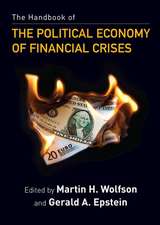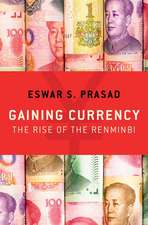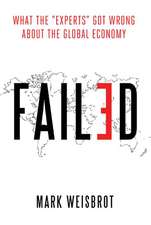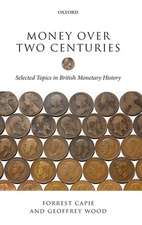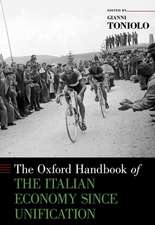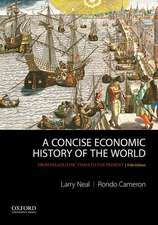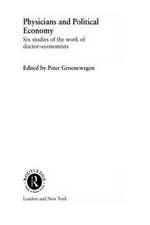Measuring Utility: From the Marginal Revolution to Behavioral Economics: Oxford Studies in History of Economics
Autor Ivan Moscatien Limba Engleză Paperback – 3 ian 2019
Toate formatele și edițiile
| Toate formatele și edițiile | Preț | Express |
|---|---|---|
| Paperback (1) | 382.96 lei 3-5 săpt. | |
| Oxford University Press – 3 ian 2019 | 382.96 lei 3-5 săpt. | |
| Hardback (1) | 589.81 lei 31-37 zile | |
| Oxford University Press – 20 dec 2018 | 589.81 lei 31-37 zile |
Preț: 382.96 lei
Nou
Puncte Express: 574
Preț estimativ în valută:
73.29€ • 79.58$ • 61.56£
73.29€ • 79.58$ • 61.56£
Carte disponibilă
Livrare economică 02-16 aprilie
Preluare comenzi: 021 569.72.76
Specificații
ISBN-13: 9780199372775
ISBN-10: 0199372772
Pagini: 344
Dimensiuni: 231 x 152 x 20 mm
Greutate: 0.48 kg
Editura: Oxford University Press
Colecția OUP USA
Seria Oxford Studies in History of Economics
Locul publicării:New York, United States
ISBN-10: 0199372772
Pagini: 344
Dimensiuni: 231 x 152 x 20 mm
Greutate: 0.48 kg
Editura: Oxford University Press
Colecția OUP USA
Seria Oxford Studies in History of Economics
Locul publicării:New York, United States
Recenzii
...the book is strikingly precise and sharp...It provides a compendium of past ideas on measurement that is nearly exhaustive.
Measuring Utility is the most comprehensive history of utility measurement in economics that currently exists.
[Measuring Unity] should be read by any researcher making use of the concept of utility in their work, but I think it has a much broader appeal. I cannot think of another work in behavioral economics that so carefully scrutinizes the emergence of a key idea and gives us the knowledge needed to further develop our own thinking. Moscati's book will be very influential.
Modern ideas on utility, including behavioral and choiceless interpretations, cannot be understood without knowing the past, including the marginal and ordinal revolutions. This book, written by the greatest historian on these topics, gives a full and perfect account. It is a must for everyone who really wants to understand modern economics.
For almost a century, from the 1880s until the 1970s, the best minds in economic theory struggled to solve the problem of measurability of utility.During this long journey they not only provided new mathematical foundations to Neoclassical economics, but also redefined its boundaries, and changed the very notion of measurement that lies at the core of contemporary science. Reconstructing the story of this remarkable achievement, Ivan Moscati has made a lasting contribution both to the history and to the philosophy of science.
Ivan Moscati has given us an extremely important history of utility theory, measurement theory, and the relationship between the two for the period from the marginal revolution in the 1870s to the behavioral economics revolution in the mid-1980s. It is a badly needed book, on a very important topic, that deals with difficult interdisciplinary material, and it is brilliantly executed.
Measuring Utility is the most comprehensive history of utility measurement in economics that currently exists.
[Measuring Unity] should be read by any researcher making use of the concept of utility in their work, but I think it has a much broader appeal. I cannot think of another work in behavioral economics that so carefully scrutinizes the emergence of a key idea and gives us the knowledge needed to further develop our own thinking. Moscati's book will be very influential.
Modern ideas on utility, including behavioral and choiceless interpretations, cannot be understood without knowing the past, including the marginal and ordinal revolutions. This book, written by the greatest historian on these topics, gives a full and perfect account. It is a must for everyone who really wants to understand modern economics.
For almost a century, from the 1880s until the 1970s, the best minds in economic theory struggled to solve the problem of measurability of utility.During this long journey they not only provided new mathematical foundations to Neoclassical economics, but also redefined its boundaries, and changed the very notion of measurement that lies at the core of contemporary science. Reconstructing the story of this remarkable achievement, Ivan Moscati has made a lasting contribution both to the history and to the philosophy of science.
Ivan Moscati has given us an extremely important history of utility theory, measurement theory, and the relationship between the two for the period from the marginal revolution in the 1870s to the behavioral economics revolution in the mid-1980s. It is a badly needed book, on a very important topic, that deals with difficult interdisciplinary material, and it is brilliantly executed.
Notă biografică
Ivan Moscati is Associate Professor of Economics at the University of Insubria, Varese, and teaches History of Economics at Bocconi University, Milan. His articles have been published in a range of journals in economics, history of economic thought, and economic methodology, and one of them was awarded the Best Article Award of the History of Economics Society.






